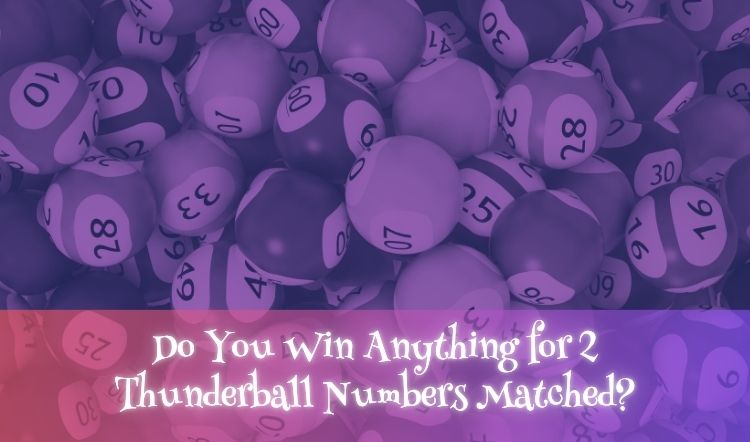
The Thunderball draw is a popular lottery game across the UK, with straightforward rules and clearly defined prize amounts. Many people are curious about what’s actually needed to receive a payout, especially if only a small portion of their numbers come up.
This blog post looks at how Thunderball prizes are allocated, what’s required to win, and whether getting just two numbers gets you anything. It also outlines how lesser prizes are typically claimed, even in the smallest cases.
Read on for the details.
How Are Thunderball Prizes Won?
To play Thunderball, you pick five main numbers from 1 to 39, along with a separate Thunderball number from 1 to 14. The draw then reveals five main numbers and one Thunderball.
How closely your selections match those drawn determines whether you qualify for a prize—and which one. Some prize combinations depend entirely on hitting the Thunderball, while others rely more on the main numbers. The value increases as more of your picks align.
Each possible win corresponds to a fixed amount, no matter how many people play. This means any prize you may be entitled to is already known in advance.
There is a specific outcome that involves two numbers—but what exactly counts?
Is There a Prize for Matching 2 Numbers on Thunderball?
Matching two numbers can lead to a prize, but only if one of those matches is the Thunderball. Two main numbers on their own do not qualify. Two main numbers plus the Thunderball qualifies for a small fixed prize.
It is sensible to check the current official prize breakdown beforehand if you’re considering buying a ticket, as operators may update the structure from time to time.
That raises a broader question: what is the minimum you need to win anything at all?
What Are the Minimum Winning Numbers in Thunderball?
It may surprise some that even matching just one number can lead to a payout, though not any number.
The very lowest prize is given when the Thunderball alone is matched. No main numbers are needed at all. This is the smallest winning combination possible in the game, and it awards £3.
One step above that, a slightly higher fixed payout is granted for hitting both one main number and the Thunderball together. From there, each additional matching main number tends to move the outcome further up the table.
So, where does matching two main numbers stand? Let’s return to that.
Does Matching Only 2 Numbers Qualify for a Prize?
On its own, getting two main numbers right does not result in a win. That combination is below the lowest paying tier.
However, two main numbers with the Thunderball qualifies. According to the most recent National Lottery data, that specific combination pays £10.
That makes it one of the lower prize tiers in Thunderball, but it does show that the Thunderball itself carries significant weight in determining outcomes.
If unsure, the official prize table is the best reference for up-to-date payout amounts and qualifying number sets.
But how is the full range of prize levels organised?
How Do Thunderball Prize Levels Work?
Each prize tier in Thunderball depends on two key elements: how many of your five main numbers match, and whether the Thunderball is also matched.
At the very top of the table, matching all five main numbers plus the Thunderball results in the highest fixed payout available in the game: £500,000. This prize is not divided between multiple winners and does not increase from one draw to the next.
The second tier—five main numbers without the Thunderball—secures a payout of £5,000. This is followed by:
- Four main numbers and the Thunderball: £250
- Four main numbers without the Thunderball: £100
Further down, matching combinations involving fewer numbers continue to qualify for fixed amounts:
- Three main numbers and the Thunderball: £20
- Three main numbers only: £10
- Two main numbers plus the Thunderball: £10
- One main number and the Thunderball: £5
- Only the Thunderball (no main numbers): £3
Each of these tiers offers a specific, pre-set amount, unaffected by how many people take part in the draw or how many winners there are. This structure allows you to know the exact value of each possible outcome in advance.
The full list is also shown on the official National Lottery website and updated if any changes are introduced. A quick glance there before you take part is always a good idea.
If a payout does occur, what happens next?
What Should You Know About Claiming Small Thunderball Wins?
For smaller wins, claiming tends to be straightforward. Tickets purchased in person can often be redeemed at the same shop, provided the amount is within their in-store limit—commonly up to £100, though some shops handle prizes up to £500.
If you choose to play online or via the National Lottery app, any small winnings are usually added automatically to your account balance after the draw.
Always keep your physical ticket until you've confirmed the payout has been processed. If you have any questions, the National Lottery website and customer services offer clear guidance on how to proceed.
Whether you're checking one number or five, always treat participation as a form of paid entertainment—not a guaranteed outcome. Decide how much you're willing to spend beforehand, and stick to that decision.
If you choose to participate in a Thunderball draw, do so with responsible gambling practices in mind, and never wager more than you are willing to lose.
*All values (Bet Levels, Maximum Wins, etc.) mentioned in relation to this game are subject to change at any time. Game features mentioned may not be available in some jurisdictions.
**The information provided in this blog is intended for educational purposes and should not be construed as betting advice or a guarantee of success. Always gamble responsibly.
